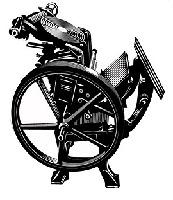- Posts: 5757
- Thank you received: 40
Federal Judge Prohibits Prayer at Texas Graduation Ceremony
- PrintSmith
-

- Mountain Legend
-

And here the pressure is not attributed to the prayer, but to the conduct that the principal required of the students while the invocation was being delivered. Again, it was not the recitation of the invocation that caused the issue, but what surrounded the invocation. The problem the court had in this instance was the perceived participation by the state via the principal of the school in the behavior of the students during the invocation. So this too fails to support the position that you have staked out that it is the utterance of the invocation that is the primary issue in the court's opinion.Kate wrote:
So you see, it is not the Rabbi who is receiving the pressure, but the student.We need not look beyond the circumstances of this case to see the phenomenon at work. The undeniable fact is that the school district's supervision and control of a high school graduation ceremony places public pressure, as well as peer pressure, on attending students to stand as a group or, at least, maintain respectful silence during the invocation and benediction. This pressure, though subtle and indirect, can be as real as any overt compulsion.
Now, when I was a child, such things as proper behavior while someone was speaking were taught to me as a matter of instilling manners. It didn't matter whether the speaker was the Den Leader of my Cub Scout Pack, a teacher in the classroom, the principal at an assembly or the priest giving his homily, the behavior expected out of me was the same in each instance. The students would be expected to maintain respectful silence while all of their guests were speaking, so fabricating a different reason for expecting such behavior while the rabbi delivered the invocation would appear at face value as someone searching for a reason to find it objectionable rather than a subtle coercion. Standing perhaps, though that is SOP for invocations, the playing of the national anthem, when the president enters a room and a host of other situations as well, so it too seems to be more of a stretch to find something objectionable as opposed to something that actually is. Manners, after all, are part and parcel of being civilized. One can show respect without adhering to what a person says. Just because I would stand when President Obama entered a room does not in any manner oblige or pressure me, subtly or otherwise, to conform to his beliefs on anything.
Please Log in or Create an account to join the conversation.
- Kate
-

- Mountain Legend
-

- Posts: 1498
- Thank you received: 0
I'm not a lawyer, so I have difficulty reading these court decisions. Perhaps you could quote me some of the Supreme Court decision which backs up your claim? I just don't see what you wrote in that court document. From what I read, the inclusion of an invocation was viewed as state sponsored establishment of religion.PrintSmith wrote:
And here the pressure is not attributed to the prayer, but to the conduct that the principal required of the students while the invocation was being delivered. Again, it was not the recitation of the invocation that caused the issue, but what surrounded the invocation. The problem the court had in this instance was the perceived participation by the state via the principal of the school in the behavior of the students during the invocation. So this too fails to support the position that you have staked out that it is the utterance of the invocation that is the primary issue in the court's opinion.Kate wrote:
So you see, it is not the Rabbi who is receiving the pressure, but the student.We need not look beyond the circumstances of this case to see the phenomenon at work. The undeniable fact is that the school district's supervision and control of a high school graduation ceremony places public pressure, as well as peer pressure, on attending students to stand as a group or, at least, maintain respectful silence during the invocation and benediction. This pressure, though subtle and indirect, can be as real as any overt compulsion.
This has nothing to do with the subject at hand. I'm not sure why you wrote this.PrintSmith wrote: Now, when I was a child, such things as proper behavior while someone was speaking were taught to me as a matter of instilling manners. It didn't matter whether the speaker was the Den Leader of my Cub Scout Pack, a teacher in the classroom, the principal at an assembly or the priest giving his homily, the behavior expected out of me was the same in each instance. The students would be expected to maintain respectful silence while all of their guests were speaking, so fabricating a different reason for expecting such behavior while the rabbi delivered the invocation would appear at face value as someone searching for a reason to find it objectionable rather than a subtle coercion. Standing perhaps, though that is SOP for invocations, the playing of the national anthem, when the president enters a room and a host of other situations as well, so it too seems to be more of a stretch to find something objectionable as opposed to something that actually is. Manners, after all, are part and parcel of being civilized. One can show respect without adhering to what a person says. Just because I would stand when President Obama entered a room does not in any manner oblige or pressure me, subtly or otherwise, to conform to his beliefs on anything.
Please Log in or Create an account to join the conversation.
- PrintSmith
-

- Mountain Legend
-

- Posts: 5757
- Thank you received: 40
The simplest way is to reduce the complex sentences into simple ones. Thus the issue in the court's eyes was:Kate wrote:
I'm not a lawyer, so I have difficulty reading these court decisions. Perhaps you could quote me some of the Supreme Court decision which backs up your claim? I just don't see what you wrote in that court document. From what I read, the inclusion of an invocation was viewed as state sponsored establishment of religion.PrintSmith wrote:
And here the pressure is not attributed to the prayer, but to the conduct that the principal required of the students while the invocation was being delivered. Again, it was not the recitation of the invocation that caused the issue, but what surrounded the invocation. The problem the court had in this instance was the perceived participation by the state via the principal of the school in the behavior of the students during the invocation. So this too fails to support the position that you have staked out that it is the utterance of the invocation that is the primary issue in the court's opinion.Kate wrote:
So you see, it is not the Rabbi who is receiving the pressure, but the student.We need not look beyond the circumstances of this case to see the phenomenon at work. The undeniable fact is that the school district's supervision and control of a high school graduation ceremony places public pressure, as well as peer pressure, on attending students to stand as a group or, at least, maintain respectful silence during the invocation and benediction. This pressure, though subtle and indirect, can be as real as any overt compulsion.
The pressure the court talks about is the pressure to stand while the invocation is being delivered, or to maintain respectful silence during the invocation and benediction. Why their respectful silence is a coercion during an invocation and not during the other speeches delivered that day remains a mystery. I thought respectful silence when an invited guest is speaking was an exhibition of good manners when I was young. Seems to me the president expects that folks will listen to his speeches with respect. I seem to remember the one member of Congress was expected to publicly apologize for not maintaining respectful silence when the president said something during one of his State of the Union addresses with which the elected representative disagreed. Even the silent shaking of the head by one of the Supreme Court Justices was deemed a breech of manners that night. Why is respectful silence a coercion in this instance yet not in the others? Beats me; which is why on its face it appears a fabricated reason to find objection instead of something that truly is actually objectionable as being coercive. Same for standing. That is simply good manners, as is standing when the president enters a room. There is no law which requires it, it is a matter of exhibiting etiquette, as it is when a toast is offered at a formal state gathering, or not talking over the playing of Hail to the Chief (or God Save the Queen). It is something instilled by the society, not the state.The undeniable fact is that the school district's supervision and control of a high school graduation ceremony places public pressure on attending students to stand as a group or maintain respectful silence during the invocation and benediction.
Please Log in or Create an account to join the conversation.
- Rick
-

- Mountain Legend
-

- Posts: 15525
- Thank you received: 163
http://www.politico.com/news/stories/0609/23510.html
The left is angry because they are now being judged by the content of their character and not by the color of their skin.
Please Log in or Create an account to join the conversation.
- LadyJazzer
-

- Mountain Legend
-

- Posts: 14880
- Thank you received: 27
Please Log in or Create an account to join the conversation.
- PrintSmith
-

- Mountain Legend
-

- Posts: 5757
- Thank you received: 40
Please Log in or Create an account to join the conversation.
- Kate
-

- Mountain Legend
-

- Posts: 1498
- Thank you received: 0
PrintSmith wrote: The simplest way is to reduce the complex sentences into simple ones. Thus the issue in the court's eyes was:
The pressure the court talks about is the pressure to stand while the invocation is being delivered, or to maintain respectful silence during the invocation and benediction. Why their respectful silence is a coercion during an invocation and not during the other speeches delivered that day remains a mystery. I thought respectful silence when an invited guest is speaking was an exhibition of good manners when I was young. Seems to me the president expects that folks will listen to his speeches with respect. I seem to remember the one member of Congress was expected to publicly apologize for not maintaining respectful silence when the president said something during one of his State of the Union addresses with which the elected representative disagreed. Even the silent shaking of the head by one of the Supreme Court Justices was deemed a breech of manners that night. Why is respectful silence a coercion in this instance yet not in the others? Beats me; which is why on its face it appears a fabricated reason to find objection instead of something that truly is actually objectionable as being coercive. Same for standing. That is simply good manners, as is standing when the president enters a room. There is no law which requires it, it is a matter of exhibiting etiquette, as it is when a toast is offered at a formal state gathering, or not talking over the playing of Hail to the Chief (or God Save the Queen). It is something instilled by the society, not the state.The undeniable fact is that the school district's supervision and control of a high school graduation ceremony places public pressure on attending students to stand as a group or maintain respectful silence during the invocation and benediction.
Seriously? You think the pressure comes from the students being forced to be respectful during a prayer and not the invocation itself?
I'm not sure where to go from here, since every time I present an argument, you find a little detail that hearkens back to your days as a cub scout and "Well, we just didn't do it that way" and "When I was a kid....."
Your idea of argument apparently is not arguing the facts in a common sense manner, but presenting your interpretation of a little detail, out of context - in a really weird way - when it is plain as day what the meaning was within the Supreme Court decision.
Are we through here or will you be dredging up another arcane argument to support some fantasy from your mind?
Please Log in or Create an account to join the conversation.
- Kate
-

- Mountain Legend
-

- Posts: 1498
- Thank you received: 0
CriticalBill wrote: I wonder if the person(s) at the graduation or any of you here that are also offended by those who reference God in a speech, are also just as offended when President Obama says "God Bless America"? In fact, in his speeches to the country, he has invoked Jesus more than Bush.....why was that necessary and why does it get ignored by all of you and most of the left wing media? Is it only ok when one of your own does it?
http://www.politico.com/news/stories/0609/23510.html
You know, it does bother me. I wish the politicians would just leave their religion in the closet.
Please Log in or Create an account to join the conversation.
- Rick
-

- Mountain Legend
-

- Posts: 15525
- Thank you received: 163
Kate wrote:
CriticalBill wrote: I wonder if the person(s) at the graduation or any of you here that are also offended by those who reference God in a speech, are also just as offended when President Obama says "God Bless America"? In fact, in his speeches to the country, he has invoked Jesus more than Bush.....why was that necessary and why does it get ignored by all of you and most of the left wing media? Is it only ok when one of your own does it?
http://www.politico.com/news/stories/0609/23510.html
You know, it does bother me. I wish the politicians would just leave their religion in the closet.
I doesn't bother me Kate, but I respect you greatly for putting your principles before your political side. I respect those who are consistent even when I disagree. It obviously wouldn't bother LJ no matter how much Obama talks in religious terms to the entire nation and the world. :thumbsup:
The left is angry because they are now being judged by the content of their character and not by the color of their skin.
Please Log in or Create an account to join the conversation.
- archer
-

- Mountain Legend
-

- Posts: 9964
- Thank you received: 8
CriticalBill wrote: It obviously wouldn't bother LJ no matter how much Obama talks in religious terms to the entire nation and the world. :thumbsup:
Why don't you ask LJ instead of YOU telling us what she is bothered by. Like kate.....I think using the "God bless" in public speeches is just wrong. The problem for politicians is if they don't use it the right calls them athiests, or Christian haters, or whatever the flavor of the day "hate the left" remark is.
Please Log in or Create an account to join the conversation.





